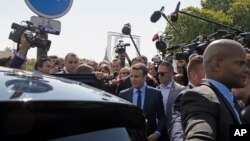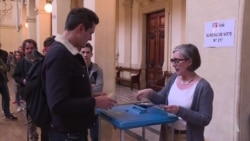ນຶ່ງມື້ ຫຼັງຈາກທີ່ ຜູ້ມີສິດບ່ອນບັດຊາວຝຣັ່ງ ໄດ້ສົ່ງທ່ານນາງເຂົ້າສູ່ການເລືອກຕັ້ງ
ປະທານາທິບໍດີຮອບສອງ ແຂ່ງກັບທ່ານ Emmanuel Macron ທີ່ນິຍົມແນວທາງ
ເປັນກາງນັ້ນ ທ່ານນາງ Marine Le Pen ຜູ້ສະໝັກຫົວຊາດນິຍົມ ຕ້ານພວກອົບພະ
ຍົບ ໄດ້ປະກາດວ່າທ່ານນນາງຈະລົງຈາກການເປັນຜູ້ນຳຂອງພັກເປັນການຊົ່ວຄາວ
ເພື່ອ ທ່ານນາງ ຈະໄດ້ເປັນຜູ້ລົງແຂ່ງຂັນ ໃນນາມປະຊາຊົນຊາວຝຣັ່ງທັງມວນ.
ໃນການເອົາບາດກ້າວດັ່ງກ່າວນີ້ ທີ່ແນໃສ່ ເພື່ອຂະຫຍາຍຄວາມສະໜັບສະໜຸນຂອງ
ທ່ານນາງໃຫ້ກວ້າງອອກໄປນັ້ນ ທ່ານນາງ Le Pen ໄດ້ກ່າວ ຕໍ່ລາຍການໂທລະພາບ
ສາທາລະນະຝຣັ່ງ ວ່າ “ຄ່ຳຄືນນີ້ ຂ້າພະເຈົ້າບໍ່ໄດ້ເປັນປະທານ ຂອງພັກແນມໂຮມ
ແຫ່ງຊາດ ຫຼື National Front ອີກຕໍ່ໄປແລ້ວ. ຂ້າພະເຈົ້າແມ່ນຜູ້ລົງສະໝັກເປັນປະທານາທິບໍດີ,” ຊຶ່ງທ່ານນາງໄດ້ກ່າວເພີ່ມຕື່ມວ່າ ທ່ານນາງ “ຕ້ອງການຢູ່ເໜືອການ
ຕັດສິນໃຈໃນພັກຝ່າຍໃດໆ.”
ໃນອັນທີ່ ນັກວິເຄາະ ໄດ້ອະທິບາຍເຖິງການເລືອກຕັ້ງທີ່ວ່ານີ້ ເປັນການສັ່ນສະເທືອນ
ແບບແຜ່ນດິນໄຫວທາງການເມືອງໃນຝຣັ່ງ, ທ່ານນາງ Le Pen ໄດ້ຮັບຄະແນນສຽງ
ປະມານ21.5 ເປີເຊັນ ຂອງຄະແນນເລືອກຕັ້ງປະທານາທິບໍດີຝຣັ່ງທັງໝົດ ໃນຄະນະ
ທ່ານ Macron ໄດ້ຮັບ 23.8 ເປີເຊັນ ຂອງຄະແນນສຽງ. ຜູ້ຊະນະ ຈະຕ້ອງໄດ້ຮັບ
ຄະແນນສຽງແບບຂາດຮອຍ ເພາະສະນັ້ນ ການເລືອກຕັ້ງຮອບ 2 ຈະຈັດຂຶ້ນໃນວັນທີ
7 ພຶດສະພາ ທີ່ຈະມາເຖິງນີ້.
ເປັນຄັ້ງທຳອິດໃນປະຫວັດສາດສະໄໝໃໝ່ຂອງສາທາລະນະລັດຝຣັ່ງ ທີ່ວ່າ ປະທານາ
ທິບໍດີຂອງຝຣັ່ງ ທີ່ຈະຖືກເລືອກຈາກສະມາຊິກຂອງພັກທີ່ບໍ່ແມ່ນແບບດັ້ງເດີມນັ້ນ,
ທີ່ໄດ້ເນັ້ນໃຫ້ເຫັນເຖິງການຕໍ່ຕ້ານການຈັດຕັ້ງ ຊຶ່ງໃນທີ່ສຸດ ສາມາດຕັດສິນໄດ້ວ່າ ຝຣັ່ງ
ຍັງຈະຍຶດໝັ້ນໃນການເປັນສະມາຊິກຂອງສະຫະພາບຢູໂຣບ ຫຼືຕິດຕາມເສັ້ນທາງສາຍ
ອິດສະຫຼະ ຄືກັນກັບອັງກິດຫລັງຈາກຖອນຕົວອອກຈາກສະຫະພາບຢູໂຣບແລ້ວ
ແລະສະຫະລັດ ພາຍໃຕ້ການນຳພາຂອງທ່ານດໍໂນລ ທຣຳ.
“ໃນນຶ່ງປີ, ພວກເຮົາ ໄດ້ປ່ຽນແປງ ການເມືອງຂອງຝຣັ່ງທັງໝົດ,” ນັ້ນຄືຄຳເວົ້າຂອງ
ທ່ານ Macron ທີ່ໄດ້ກ່າວໄວ້ ໃນການໂຮມຊຸມນຸມສະຫຼອງໄຊຊະນະ ໃນແລງວັນອາທິດ
ຜ່ານມານີ້.
ທ່ານ Macron ໄວ 39 ປີ ທີ່ເປັນກາງອຽງຊ້າຍ ແມ່ນອະດີດລັດຖະມົນຕີເສດຖະກິດ ຜູ້ຊຶ່ງນິຍົມສະຫະພາບຢູໂຣບ ແລະສົ່ງເສີມທຸລະກິດ ທີ່ນຳພາໂດຍ ການຢັ່ງຫາງສຽງຂອງການ
ເລືອກຕັ້ງ ເຖິງແມ່ນວ່າທ່ານໄດ້ພົວພັນກັບ ປະທານາທິບໍດີພັກສັງຄົມນິຍົມທ່ານ Francois Hollande ທີ່ບໍ່ໄດ້ຮັບຄວາມນິຍົມຈາກປະຊາຊົນນັ້ນກໍຕາມ.
ການເຄື່ອນໄຫວ En Marche ໃນໄລຍະນຶ່ງປີ ທີ່ດຶງດູດຈິດໃຈ ສ່ວນໃຫຍ່ແລ້ວ ນອນຢູ່ ໃນຄວາມຈະເລີນຮຸ່ງເຮືອງ ໃນພື້ນທີ່ຕົວເມືອງຕ່າງໆຂອງຝຣັ່ງ ບ່ອນທີ່ໂລກາພິວັດ ໄດ້ສົ່ງ ຜົນປະໂຫຍດໃຫ້ແກ່ຫຼາຍໆຄົນ.
ອ່ານຂ່າວນີ້ເພີ້ມຕື່ມເປັນພາສາອັງກິດ
ເຊີນຊົມ: ການແຂງຂັນລະຫວ່າງ ທ່ານ Macron ກັບທ່ານນາງ Le Pen Head ທີ່ເຂົ້າ ຮອບສຸດທ້າຍ ໃນການແຂງຂັນປະທານາທິບໍດີ ໃນຝຣັ່ງ
In a move aimed at broadening her appeal, Le Pen said on French public television, "Tonight, I am no longer the president of the National Front. I am the presidential candidate,'' adding that she wants to be "above partisan considerations.''
In what analysts describe as a political earthquake in France, Le Pen received 21.5% of the French presidential vote, while Macron garnered 23.8% of the vote. A winner needs an absolute majority, so a second round will be held on May 7.
It is the first time in the history of the modern French Republic that the presidency will be held by a member of a non-traditional party, highlighting a deep anti-establishment sentiment that ultimately could determine whether France remains a part of the EU or follows an independent path like that of post-Brexit Britain and the United States under Donald Trump.
"In one year, we have entirely changed French politics," Macron said at a victory rally Sunday night.
Macron, a 39-year-old center-left former economy minister who is pro-EU and pro-business, led pre-election polls despite his previous association with unpopular Socialist President Francois Hollande. The appeal of his year-old En Marche! movement lies mainly in France's prosperous urban areas, where globalism has benefited many.
His challenge is to galvanize support of centrists and the left, including members of France's fractured Socialist party, and convince voters he does not represent a continuation of Hollande's policies. He received congratulations from EU officials.
Le Pen, who wants France out of the European Union, has succeeded in winning over large numbers of former leftists and centrists.
News that Le Pen advanced to the second round sent left-wing protesters into Paris streets, where they clashed with police.
Among the top contenders in the 11 candidate field was former Prime Minister Francois Fillon, a center-right social conservative whose bid was damaged by allegations of creating fake jobs for close relatives. Conceding defeat on Sunday, he endorsed Macron.
Some 50,000 police officers backed by 7,000 soldiers, including special forces, were deployed to the streets following a terrorist attack days earlier that was claimed by the Islamic State terrorist group.
The shooting along the iconic Champs-Elysees in the heart of Paris left one police officer dead and several other people injured.
Observers thought the attack would benefit Le Pen.
In a tweet one day after the Champs Elysees shooting, U.S. President Trump said, "The people of France will not take much more of this. Will have a big effect on presidential election!"
Analysts and voters interviewed saw this as the most unpredictable election since World War II. One third of voters were undecided just days before the balloting.
In the last few weeks before the vote, far-left candidate Jean-Luc Melenchon surged in the polls and so did discussion of the previously obscure candidate in social media.
Among the ways his campaign lured young voters was through the release of a video game in which a player pretending to be Melenchon is shown in a battle against the rich and powerful.
Anger at the establishment is the sentiment driving voters in an election in which security, France's lagging economy, its 10 percent unemployment rate, and Islamist extremism are issues on the minds of those on the left and on the right.
That, say analysts, is what influenced large numbers of people, including some of the middle and upper class residents of Paris, to vote for candidates of the extreme.
"Some of them for the thrill of it. It's the principle, you know. Like playing Russian roulette, but politically. Some others it would be because they despise the elite of this country," said Thomas Guénolé, a political analyst in Paris, told VOA.
Socialist President Francois Hollande announced he would not to run for reelection after his approval ratings sank to 4%, something analysts widely attribute to a string of terrorist attacks in France and a stagnation of economic growth during his tenure. Hollande is the first incumbent president not to seek reelection in the history of the modern French republic.
Hollande on Monday urged people to back Macron and reject Le Pen, whose place in the run-off he said represents a "risk" for France.









